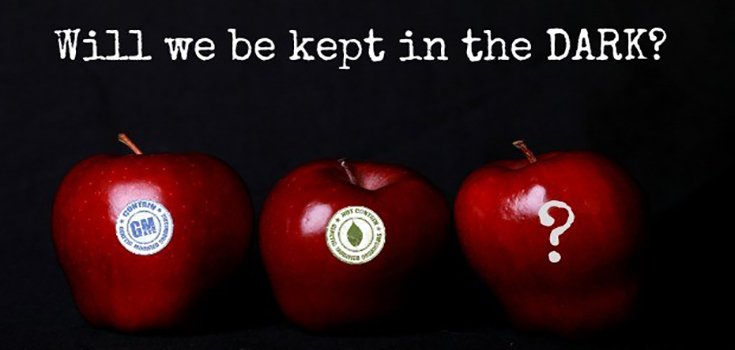Big Food Is Still Fighting Vermont’s GMO Labeling Bill

Vermont is a little state, but it could force some enormous decisions. Will the Big Food corporations have to label GMO packages for Vermont, whose population is smaller than Brooklyn’s? They will if the Senate votes against the ‘DARK’ (‘Deny Americans the Right to Know’) Act (H.R. 1599) introduced in 2015 by Rep. Mike Pompeo.
The DARK bill was moved to the Senate and referred to its Committee on Agriculture, Nutrition, and Forestry last year. It has not yet been brought up for a full Senate vote.
Meanwhile, companies like PepsiCo, and General Mills are making quite a stink about it. Vermont’s mandatory labeling law is set to go live on July 1, 2016, and Big Food doesn’t want that to happen.
Greed and dishonesty are rising in Big Food like never before. So much so in fact, that the industry will likely turn to tactics like money laundering and fraud, as they have before, to try to stop states like Vermont from deciding their own GMO fate.
Powerful organizations have heavily lobbied and spent eye-popping sums to fight state-by-state labeling mandates.
Big Food Industry Sued Vermont
The International Dairy Foods Association, the Snack and Food Association, the National Association of Manufacturers, and the Grocery Manufacturers Association (GMA) all sued Vermont in federal court last year. (The GMA represents over 300 food and beverage titans such as ConAgra, Nestlé, Coca-Cola, Kellogg and Hershey.)
They want to stop the new law, claiming that the legislation “imposes burdensome new speech requirements” and violates the Constitution by “regulating nationwide distribution and labeling practices that facilitate interstate commerce.”
In 2015, a federal court dismissed an injunction that would have blocked Vermont’s GMO labeling law from taking effect. The GMA filed an appeal that’s still pending.
An internal document obtained from the GMA by researcher Michele Simon makes it clear that they planned to steamroll states’ GMO labeling rights at every turn. California’s Prop. 37 and Washington’s I-522 were already in their crosshairs before Vermont passed its mandatory labeling law.
HR 1599 is just one of the industry’s pieces of legislation trying to undo the democratic rights of states to mandate GMO labeling for their food.
New DARK Act Is a Major Threat to GMO Labeling
Sen. Pat Roberts (R-KS), who made a big push for H.R. 1599, is a major recipient of agribusiness campaign funds. Roberts is also pushing a bill of his own. His S. 2609 forbids states from mandating GMO labeling. It’s now in the hands of the Senate, largely Democrats. who can pass it or fail it. Voting may be done as early as March 16.
At a weekly meeting of the Topeka Rotary Club a few weeks ago, Roberts made an offhand remark that startled some people:
“Vermont, unfortunately, decided to leave the union and put up their own label.”
You can see that Vermont’s bill has Big Food angry. The last sentence of Roberts’ anti-labeling S. 2609 says:
“No state or a political subdivision of a state may directly or indirectly establish … or continue in effect as to any food or seed in interstate commerce any requirement relating to the labeling of whether a food … or seed is genetically engineered.”
Vermont is just the beginning of an immense grassroots uprising of Americans who are tired of being lied to and tired of GMOs. They deserve to have clear labeling so they can make informed choices. When all states adopt labeling laws similar to Vermont’s, the GMA and the biotech industry will have to obey the people.
Source:
Featured image source: Natural Blaze
